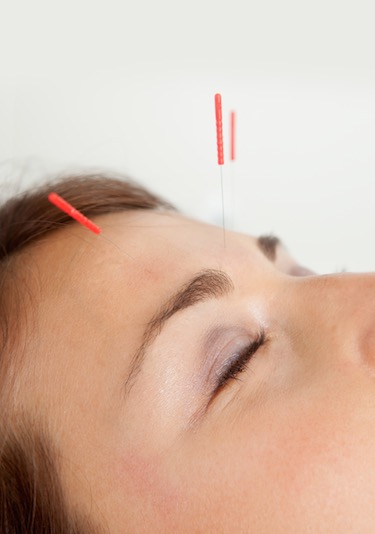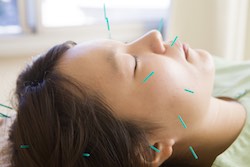Acupuncture is safe and effective for allergy treatments. Research published in American Journal of Rhinology & Allergy finds acupuncture effective for the treatment of allergic rhinitis. This condition is often referred to as hay fever and is characterized by a runny nose, postnasal drip, sneezing, watery or itchy eyes, and irritation of the ears or throat.  Acupuncture significantly lowered Immunoglobulin E (IgE), an antibody associated with allergies and hypersensitivities, in allergic rhinitis patients. In addition, subjective measures demonstrated acupuncture’s ability to improve quality of life scores. Acupuncture demonstrated significant efficaciousness in reducing allergic rhinitis symptoms including the reduction of nasal symptoms.
Acupuncture significantly lowered Immunoglobulin E (IgE), an antibody associated with allergies and hypersensitivities, in allergic rhinitis patients. In addition, subjective measures demonstrated acupuncture’s ability to improve quality of life scores. Acupuncture demonstrated significant efficaciousness in reducing allergic rhinitis symptoms including the reduction of nasal symptoms.
The researchers conducted a meta-analysis sorting for quality investigations from 174 randomized-controlled allergic rhinitis studies. A final selection of 13 quality trials consisting of a total sample size of 2,365 patients was examined. The researchers note that the study includes recent “multicenter, randomized, parallel-controlled trials with high quality” to support consistency of conclusions.
A primary outcome measure was the nasal symptom score. The researchers state that the, “Acupuncture group produced significantly greater diminution of nasal symptoms than did (the) control group.” Two randomized-controlled trials tested for a physical component score. Both demonstrated that acupuncture “was superior to the control group in improving physical health.” Three of the studies tested for IgE changes and all documented significant reductions in serum IgE. Two studies examined an overall mental component score. Both indicated “a significant trend in favor of the acupuncture group” for mental symptom improvement.
The researchers note, “Our meta-analysis showed that (the) acupuncture group has (a) superior effect in reduction of both rhinitis symptoms and the requirement for antiallergic medication compared with (the) control group.” The quality of life score significantly improved with acupuncture and was a measure of several components: sleep, non-nasal/eye symptoms, emotional function, practical problems, nasal symptoms, eye symptoms, activities. Serum IgE score improvements were found in the acupuncture group. The researchers note that, “This result showed strong and consistent evidence that acupuncture treatment leads to favorable responses in immunologic outcomes, which have been shown to be helpful in trials of proven therapeutic modalities, such as allergen-specific immunotherapy.”
Liu et al. compared allergic rhinitis acupuncture treatment with loratadine, a histamine antagonist drug used for the treatment of allergies. In the short term, acupuncture achieved a 96.7% total effective rate and the medication group achieved a 93.3% total effective rate. However, a long term follow-up demonstrated acupuncture’s ability to produce significantly superior positive patient outcomes. The follow-up reveals that acupuncture achieved an 86.7% total effective rate and loratadine achieve a 56.7% total effective rate. The researchers conclude, “The acupuncture at three nasal points and the acupoints selected by syndrome differentiation achieves the similar short-term efficacy on perennial allergic rhinitis as compared with the oral administration of loratadine. The acupuncture therapy presents the obvious advantages on long-term efficacy.”
The study compared the application of three acupuncture points compared with oral administration of loratadine. The randomized investigation divided allergic rhinitis patients into two groups of thirty patients in each group. The medication group received loratadine for four weeks, 10 mg per day. The acupuncture group received acupuncture every two days, three times per week for a total of four weeks. The three point acupuncture prescription used in the study was:
- Yingxiang (LI20)
- Yintang (EX-HN 3)
- Bitong (Extra)
Symptoms and physical signs were recorded and compared. Acupuncture slightly outperformed the medication group in the short-term and significantly outperformed the loratadine group in the long-term. 
The treatment of allergic rhinitis is also treated with herbal medicine and Tuina (Chinese medical massage) within the Traditional Chinese Medicine (TCM) system. Research supports these medical modalities. Yang et al. note, “The treatment of pediatric allergic rhinitis by combining Tuina and Chinese herbal medicines had an overall effectiveness rate of 85.71%.” The herbal medicines investigated in the study were classic TCM herbal formulas: Yu Ping Feng San, Gui Zhi Tang. Yang et al. add that Tuina combined with the herbal formulas produces positive therapeutic effects for pediatric allergic rhinitis “and should be considered as a treatment for this condition.”
A nationwide population study in Taiwan reveals that herbal medicine is a primary treatment of choice for children with allergic rhinitis. A study published in the International Journal of Pediatric Otorhinolaryngology of 1,000,000 children under the age of 18 identified a total of 97,401 children with allergic rhinitis. A total of 63.11% of children with allergic rhinitis used TCM to treat the condition. Herbal medicine accounted for 99.1% of the children using TCM and 0.9% received acupuncture or manipulative therapies. The most commonly used herbal formula was Xin Yi Qing Fei Tang (Magnolia Flower Lung Clearing Decoction). A total of 23.44% of the children took this formulation. The single most used individual herb, at 13.78%, was Chan Tui (Periostracum cicada). The researchers note that “approximately two-thirds of pediatric AR (allergic rhinitis) patients were prescribed TCM treatments in Taiwan.”
References:
Feng, Shaoyan, Miaomiao Han, Yunping Fan, Guangwei Yang, Zhenpeng Liao, Wei Liao, and Huabin Li. "Acupuncture for the treatment of allergic rhinitis: A systematic review and meta-analysis." American journal of rhinology & allergy 29, no. 1 (2015): 57-62.
Liu, T. S., R. Qiu, and X. S. Lai. "[Efficacy on perennial allergic rhinitis treated with acupuncture at three nasal poinits and the acupoints selected by syndrome differentiation]." Zhongguo zhen jiu= Chinese acupuncture & moxibustion 34, no. 11 (2014): 1083-1086.
YANG, Zong-bao, L. I. U. Qiong, and Chen-guang WANG. "Treatment on 28 cases of pediatric allergic rhinitis by combining Tuina and Chinese herbal medicine." World Journal of Acupuncture-Moxibustion 24, no. 3 (2014): 66-68.
Yen, Hung-Rong, Kai-Li Liang, Tzu-Ping Huang, Ji-Yu Fan, Tung-Ti Chang, and Mao-Feng Sun. "Characteristics of Traditional Chinese Medicine Use for Children with Allergic Rhinitis: A Nationwide Population-based Study." International Journal of Pediatric Otorhinolaryngology (2015).


